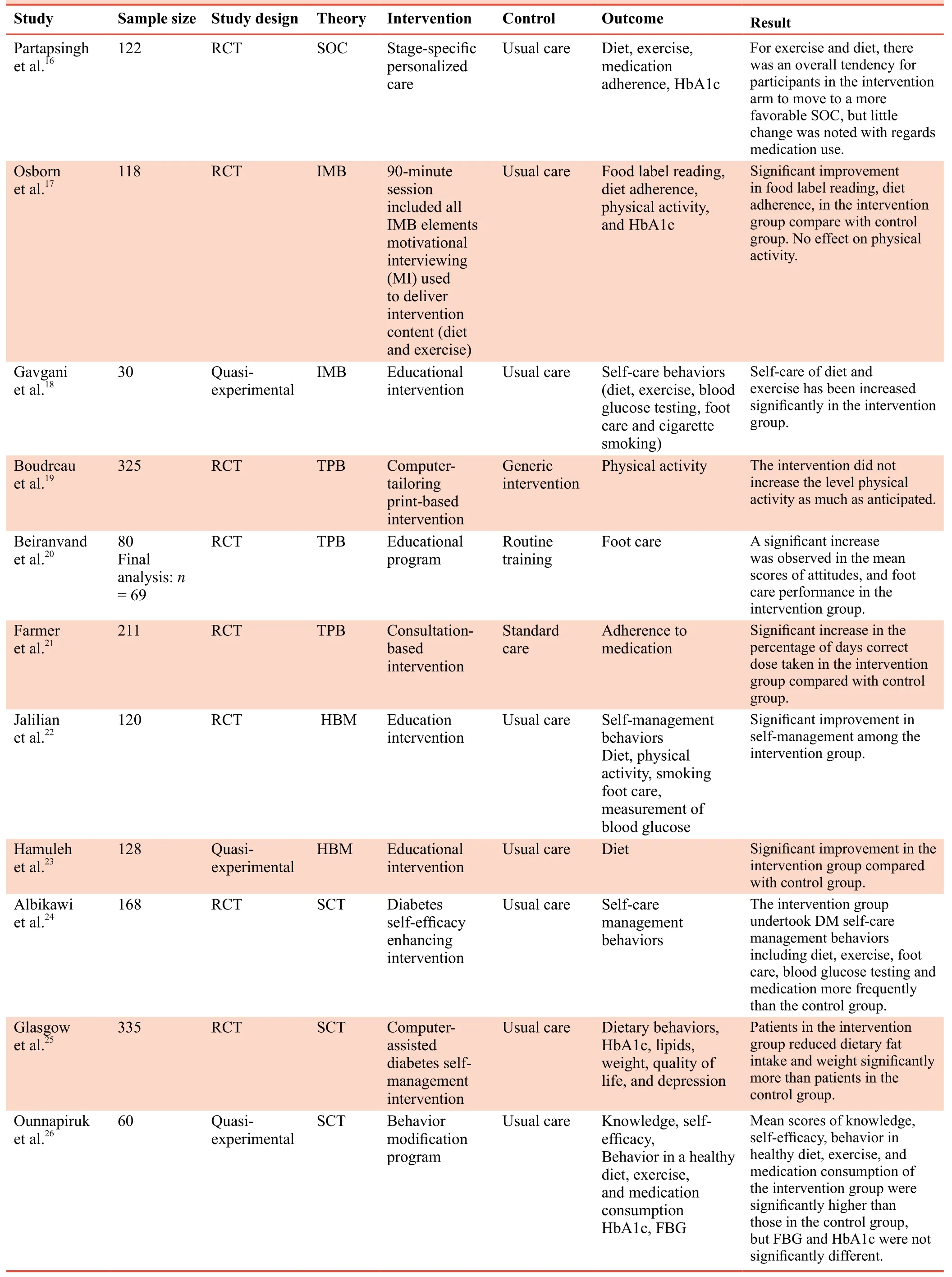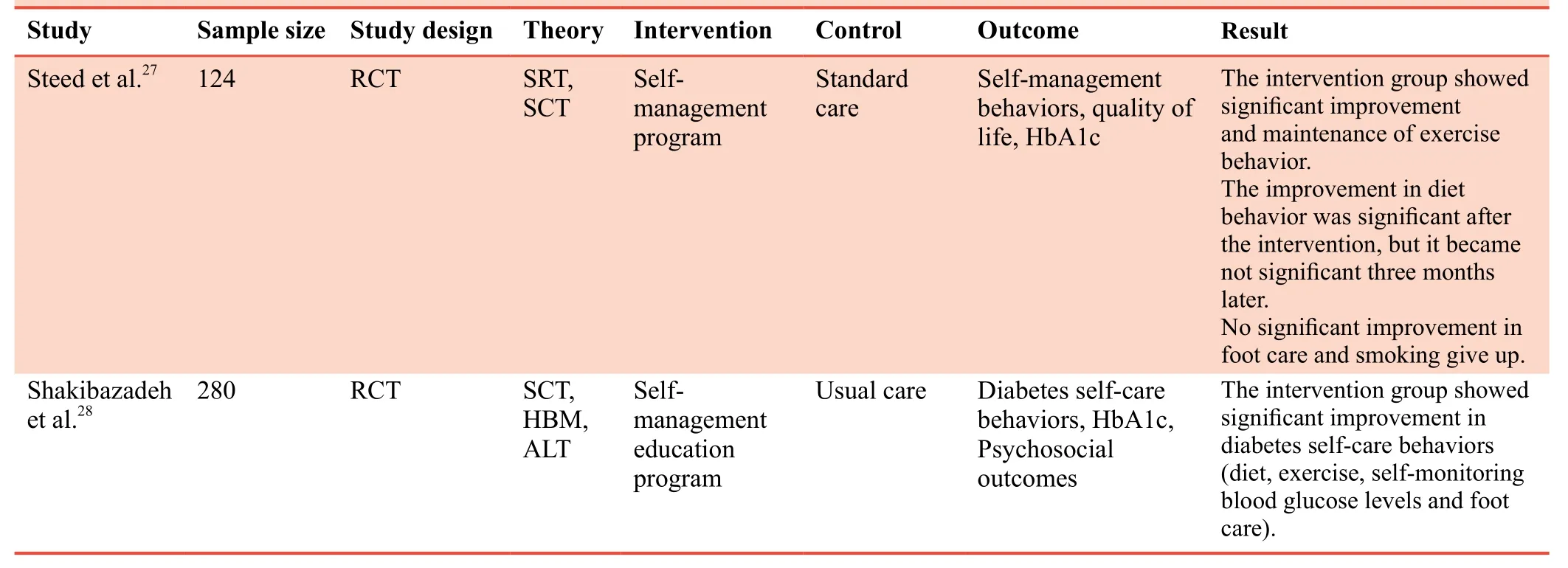Systematic review on effectiveness of theory-based intervention on self-care behaviors among patients with type 2 diabetes
2018-10-18AbeerYahyaAhmedAlWashaliHayatiKadriSurianiIsmailHejarAbdulRahmanYahyaElezzy
Abeer Yahya Ahmed Al-Washali , Hayati Kadri Suriani Ismail Hejar Abdul Rahman Yahya A.Elezzy
1 Department of Community Health, Faculty of Medicine and Health Sciences, University Putra Malaysia, Serdang, Selangor, Malaysia
2 Faculty of Medicine, Sana’a University, Head of Medical Department, Al Thawra General Teaching Hospital, Sana’a, Yemen
Abstract
Key words: theory-based intervention; self-care behaviors; type 2 diabetes; social cognitive theory; health belief model; theory of planned behavior; stages of change model; information motivation behavioral skill model; systematic review
INTRODUCTION
Diabetes is one of the non-communicable diseases, which becomes a health problem worldwide due to a continuous increase in its prevalence.1The World Health Organization estimates that 422 million adults have diabetes mellitus worldwide.2Type 2 diabetes accounts for 85% to 95% of all diabetes in high-income countries and may account for an even higher percentage in low- and middle-income countries.3People with diabetes are at risk of developing some disabling and life-threatening health problems.Self-care behaviors are necessary to maintain and improve the health of patients with type 2 diabetes.Many studies indicate that self-care behaviors influence glycemic control and a variety of interventions aimed at improving self-care in individuals with diabetes have resulted in significant decreases in hemoglobin A1c (HbA1c)over time.4-6
Self-care behaviors are defined as the activities diabetes patients perform to take care of their health regarding diet,exercise, glucose monitoring and medication intake.7According to the American Association of Diabetes Educators, seven essential self-care behaviors predict good outcomes.These are healthy eating, being physically active, monitoring of blood sugar, compliant with medications, good problem-solving skills, healthy coping skills and risk-reduction behaviors.8All these seven behaviors are positively correlated with good glycemic control, reduction of complications and improvement in quality of life.9
Behavioral changes are considered as a core component of self-care, so any intervention to improve self-care should focus on behavioral changes.10The self-care education and intervention should be based on theoretical principles to become more effective.11Healthy behavior theories can provide guidelines to design implement, deliver and evaluate interventions because health behavior theories describe the factors that guide people's behavior.12The theory-based intervention provides more understanding about the causes of failure or success of intervention.12This systematic review aims to investigate the effectiveness of the theory-based intervention on self-care behaviors among patients with type 2 diabetes.
DATA AND METHODS
Data retrieval
A systematic search was conducted to identify all studies that examined the effect of the theory-based intervention on diabetes self-care behaviors.Medline, PubMed, ScienceDirect, and CINAHL database were searched to identify relevant English studies published between 2005–2017.The reference lists of included studies were screened to identify relevant studies.The key words that have been used to search for relevant studies were type 2 diabetes, diabetes self-care behaviors, theory-based intervention, and the name of the behavior theories such as social cognitive theory, health belief model, and other theories.Because self-care and self-management are being used interchangeably in some literature, self-management was entered to obtain all relevant studies.
Inclusion and exclusion criteria
Included studies were randomized controlled trials and quasiexperimental studies involving patients with type 2 diabetes aged ≥ 18 years.The intervention should be theory-based, and the outcome was one or more of diabetes self-care behaviors.
Any study included patients with type 1 diabetes, or theorybased study did not mention the name of the theory used were excluded.
Assessment of study quality
Downs & Black’s checklist was used to assess the methodological quality of the quasi-experimental studies.13The checklist consists of 27 questions, totaling score of 32 points.For assessing the quasi-experimental studies 21 questions from the checklist were used with a maximum final score of 24, the six questions that excluded were related to randomized clinical trials.The cut-off point used to consider the study of good quality was of 12 points (> 50% of the maximum score).14For assessing the quality of randomized control trial studies,Cochrane risk of bias tool has been used.15The tool examines seven domains of potential bias (sequence generation, concealment of allocation, blinding of participants and personnel,blinding of outcome assessment, incomplete outcome data,selective outcome reporting, and other sources of bias).Each domain is rated having a low, unclear, or high risk of bias.
Data extraction
Selection of studies was executed through analysis of title,followed by reading the abstracts to identify those, which were fully read.Data extraction and quality assessment were conducted on studies chosen for this systematic review, and results were arranged according to the theory used in the intervention.Some studies described various outcomes not only the diabetes self-care behaviors.In these kinds of studies, we concentrated only on the diabetes self-care behaviors outcomes.This systematic review follows the Preferred Reporting Items for Systematic Reviews and Meta-Analyses(PRISMA) statement.
Statistical analysis
Descriptive analysis was adopted if heterogeneity was big between the two groups or unable to find the sources of heterogeneity.
RESULTS
Description of study
A total of 582 studies were identified in the initial search.The titles and abstract of all the studies were screened, of which only 40 studies met the inclusion criteria.After reading the full text of those 40 studies, only thirteen were suitable to be included in this systematic review (Figure 1).Ten studies were randomized control trial, and three were quasi-experimental.Table 1 provides details of the included studies.
Assessment of study quality
The result of the quality assessment of the quasi-experimental studies showed that one study got 13 points23and another study got 12 points26, this means good quality.14However, one study got 9 points18and this means poor quality.14The result of the quality assessment of the randomized controlled trials is shown in Table 2.
The intervention in two studies was based on more than one theory,27,28however, the intervention in rest of studies were based only on one theory.The results are grouped according to the type of theory that guided the studies’ interventions.
Results of systematic review Health belief model
Three studies were based on health belief model,22,23,28and Shakibazadeh et al.28also based on another two theories.

Figure 1: Flowchart of the systematic review process using PRISMA checklist.

Table 1: Studies included in this systematic review

Table 1: Continued

Table 2: Quality assessment of studies included in the systematic review
A study was done by Hamuleh et al.23in Iran to examine the effects of education on diet adherence among patients with type 2 diabetes.The intervention was deliveredvialectures and pamphlets in four 40 minutes weekly sessions.Three months after the intervention, participants in the intervention group showed significant differences in the perceived susceptibility,perceived severity, and perceived barriers to the type of diet consumed compared to the control group.
A study was also done by Jalilian et al.22in Iran to evaluate the efficiency of self-management promotion educational program intervention among patients with type 2 diabetes.The intervention lecture and group discussion consisted of six sessions (45–60 minutes each).Two months after the intervention, participants in the intervention group showed significant differences in the perceived severity, susceptibility, benefit,barrier, and self-management.
The intervention of a study by Shakibazadeh et al.28, which was done in Iran, was based on three theories (health belief model, social cognitive theory and adult learning theory).The intervention, which consisted of eight educational sessions (2.5 hours each), was designed to evaluate the effectiveness of the Persian Diabetes Self-Management Education program at two weeks, 8 weeks and 18–21 months.The intervention group showed significant improvements in the self-care behaviors.
Theory of planned behavior
The interventions in three studies were based on theory of planned behavior.19-21The computer-tailoring print-based intervention in a study by Boudreau et al.19, which was done in Canada, was developed to promote the regular physical activity among people with type 2 diabetes.The result showed that the intervention did not increase the physical activity as much as expected.
Farmer et al.21conducted single 30 minutes consultationbased intervention session to evaluate the effect of the intervention to support adherence to oral glucose-lowering medication among patients with type 2 diabetes in the UK.Twenty weeks after the intervention, the mean percentage of medication adherent days was 77.4% in the intervention group and 69.0%in the control group (P= 0.044).
Beiranvand et al.20developed 4-week educational intervention to improve foot care in patients with type 2 diabetes in Iran.Different methods were used to deliver the intervention components such as lectures, group discussions, question and answer sessions and PowerPoint slides.A significant increase was observed, after the intervention, in the mean scores of attitudes, and foot care performance in the intervention group.
Stages of change model
One study intervention was based on the stages of change model.16Partapsingh et al.16developed patient-physician consultations based intervention to improve glycaemic control among patients with type 2 diabetes in Trinidad.The secondary outcomes of this study were the patients’ readiness to change which measured by identifying patients’ stages of change for managing their diabetes by diet, exercise, and medications.After 48 weeks, the result showed that for exercise and diet there was an overall tendency for participants in the intervention arm to move to more favorable stages of change, but little change was noted with regards medication use.
Information motivation behavioral skill model
Two intervention studies were based on information motivation behavioral skill model.17,18
Osborn et al.17developed 90-minute single session culturally tailored diabetes self-care intervention to evaluate the intervention effect on food label reading, diet adherence,physical activity, and glycemic control among Puerto Ricans with type 2 diabetes in the USA.The food label reading and diet adherence were significantly improved in the intervention group at three months compared with the control group but no significant improvement in the physical activity behavior.
Gavgani et al.18developed two intervention sessions (30 and 100 minutes) to evaluate the effectiveness of the intervention to improve self-care behaviors among patients with type 2 diabetes in Iran.Findings revealed that there were significant increases in the self-care of diet and exercise among the intervention group at two months compared with the control group.However, there was no significant change in the foot care and self-monitoring of blood sugar.
Social cognitive theory
Interventions in four studies were based on social cognitive theory.24-27A study also was also performed by Steed et al.27based on another theory.
Glasgow et al.25developed a brief computer-assisted diabetes self-management intervention to evaluate the effect of this intervention on dietary change among patients with type 2 diabetes in Colorado.At 2-month follow up, the patients in the intervention group showed significantly reduced dietary fat intake compared with the control group, however; there was no change in fruit and vegetable intake.
Ounnapiruk et al.26implemented behavior modification program to evaluate the effect of the program for people with uncontrolled type 2 diabetes in Thailand.The intervention consisted of four group sessions, and each session consisted of 2 hours of group interaction.At 12 weeks, the intervention group had significantly improved scores of a healthy diet, exercise,and medication consumption compared to the control group.
Albikawi et al.24developed a study to evaluate the effectiveness of diabetes self-efficacy enhancing intervention among Jordanian patients with type 2 diabetes on diabetes self-care behaviors.The result showed that the participants in the intervention group had higher levels of diabetes self-care behaviors at 2 weeks and 3 months of follow-up compared with the control group.
Steed et al.27developed a self-management program for patients with type 2 diabetes in the UK.The intervention was based on self-regulatory theory and social cognitive theory.At immediate post-intervention and 3-month follow-up, the intervention group showed significant improvement in exercise behavior and blood glucose monitoring.The intervention group showed significant improvement in dietary behavior at immediate post-intervention, although levels deteriorated at 3-month follow-up.There was no significant improvement in the foot care behavior and smoking cessation.
DISCUSSION
Diet
Dietary behavior is one of the important components in diabetes management.It has an essential role in improving glycemic control and other metabolic outcomes.29Ten studies16-18,22-28reported on dietary outcomes.These ten studies showed significant improvement in the dietary behaviors between intervention and control groups.
Physical activity
Physical activity has an important role in management of type 2 diabetes.The result of one meta-analysis showed that physical activity significantly improves glycaemic control, increases insulin sensitivity and reduces visceral adipose tissue and plasma triglyceride level.30Nine studies16-19,22,24,26-28reported on physical activity behaviors.Seven studies16,18,22,24,26-28reported significant improvement in the physical activity behavior between intervention and control groups.However, two studies17,19reported no significant improvement in the physical activity behavior.
Self-monitoring of blood glucose
Self-monitoring of blood glucose is considered as an important tool in managing diabetes.It provides the patients with diabetes the ability to measure their blood glucose level at any time and helps prevent the sequels of very high or very low blood sugar.8
Four studies18,22,24,28reported on self-monitoring of blood glucose levels.Three studies22,24,28reported significant improvement in the self-monitoring of blood glucose levels.The study of Gavgani et al.18reported that there was no significant improvement in the self-monitoring of blood glucose levels behavior in the intervention group.
Foot care
Foot care is one of the important diabetes self-care behaviors that can prevent diabetes-related foot complications.31Six studies18,20,22,24,27,28reported on foot care behaviors.Four studies20,22,24,28reported significant improvement in the foot care behavior among the intervention groups compared with the control group.However, two studies18,27reported no significant improvement.
Smoking
Smoking cessation is one of the risk reduction behaviors,which is considered one of the diabetes self-care behaviors.8Solberg et al.32reported that smokers with diabetes tend to be less actively involved in their diabetes care than nonsmokers and they are more likely to report often feeling sad or depressed.In this review, three studies18,22,27reported on smoking cessation and the results showed no improvement in this behavior.
Medication adherence
Medication adherence is an important consideration in diabetes care.Capoccia et al.33reported that higher adherence to diabetes medications was associated with improved glycemic control, fewer emergency department visits, decreased hospitalizations, and lower medical costs.Four studies16,21,24,26reported on medication adherence behavior and three of these studies21,24,26reported significant improvement in the medication adherence.However, Partapsingh et al.16reported little or no change for medication used except for a decrease in the numbers of patients in the contemplation stage.
Overall, the results indicated that theory-based interventions are effective in enhancing diabetes self-care behaviors.The dietary behavior is the most common self-care behavior included in the studies and shows significant improvement.However, smoking cessation behavior is the less common behavior included in the studies, and there was no intervention effect on this behavior.Researchers in the future should focus on the best theory for each diabetes self-care behavior.
Conclusion
Managing type 2 diabetes is complex because it depends on a set of activities and behaviors the patient with diabetes should do.This review used a systematic review to provide an evidence-based evaluation of the effectiveness of the theorybased intervention on diabetes self-care behaviors among patients with type 2 diabetes, and we concluded that theory-based interventions are effective to improve the diabetes self-care behaviors among patients with type 2 diabetes.Health care providers who treat patients with diabetes can adapt the results of these kinds of studies to improve the patients’ self-care behaviors.
Author contributions
Literature retrieval and manuscript preparation: AYAW; manuscript revision and final approval: HK; manuscript review and editing: SI,HAR, and YAE.
Conflicts of interest
Authors declare that there is no conflict of interest regarding publication of this article.
Financial support
None.
Reporting statement
This systematic review follows the Preferred Reporting Items for Systematic Reviews and Meta-Analyses (PRISMA) statement.
Plagiarism check
Checked twice by iThenticate.
Peer review
Externally peer reviewed.
Open access statement
This is an open access journal, and articles are distributed under the terms of the Creative Commons Attribution-NonCommercial-ShareAlike 4.0 License, which allows others to remix, tweak, and build upon the work non-commercially, as long as appropriate credit is given and the new creations are licensed under the identical terms.
33.Capoccia K, Odegard PS, Letassy N.Medication adherence with diabetes medication: a systematic review of the literature.Diabetes Educ.2016;42:34-71.
杂志排行
Clinical Trials in Degenerative Diseases的其它文章
- What the future holds for the challenging hereditary spastic paraplegia?
- High focused Evaluation of Atherosclerotic risk profile in Retinal Thrombosis: Vascular events Incidence, Sex involvement and Interventional outcomes assessed by Ophthalmologists and internists Network – HEART VISION study protocol
- Accurate identification of potential critical coronary lesions for the reduction of risk of cardiovascular events: study protocol for a randomized, open-label,active-controlled multi-center trial
- Multi-component botanical drugs for degenerative diseases
- Using robotic-assisted technology to improve lower-limb function in people with stroke
